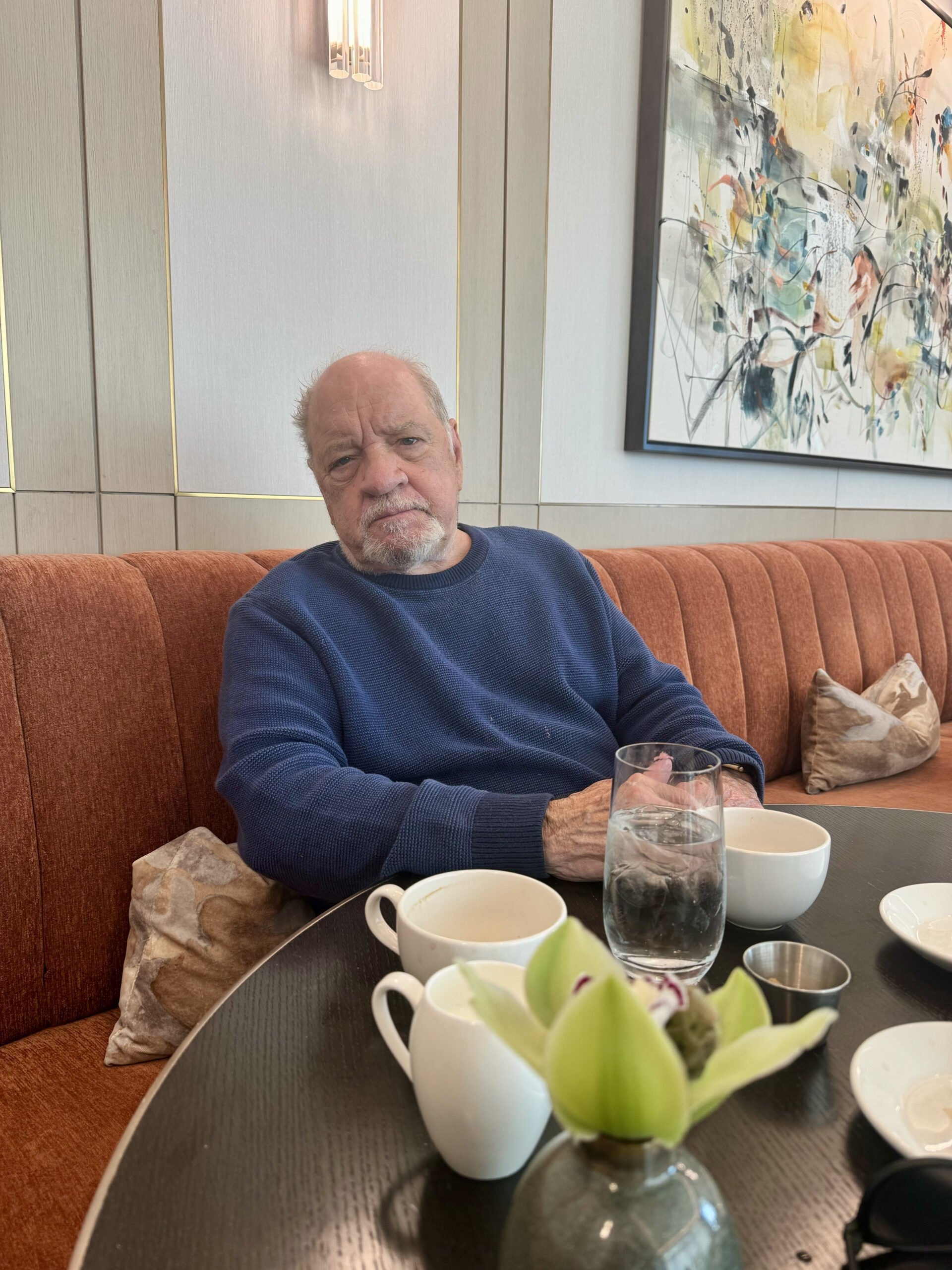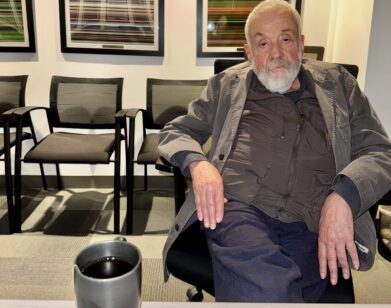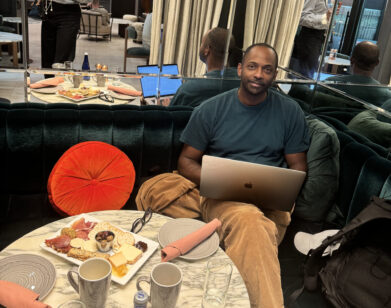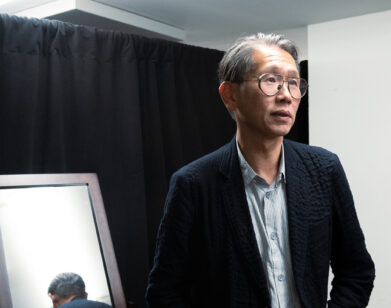NYFF
Paul Schrader on Faith, Facebook, and Bisexual Awareness
FRIDAY 11:52 AM OCTOBER 11, 2024 NEW YORK CITY
Before the New York Film Festival premiere of his 25th feature film, Oh, Canada, the virtuosic Paul Schrader took to Facebook to announce that he was looking for a new assistant. “It’s a shit and ice cream job,” he wrote in his characteristically blunt manner, the same one he adopts in his delightful Facebook reviews of contemporary films like Oppenheimer (“the best, most important film of this century”) and Tenet (“what were they thinking?”). Last week, when Jeremy O. Harris met up with Mr. Schrader in Manhattan, the former Film Studies major explained his inclination for frequent posting. “I still have the critical impulse,” he said. “Occasionally, you need to scratch it.” Over breakfast, Schrader talked to us about Calvinism, sexuality, Joker: Folie à Deux (“a really bad musical”), big-budget commercial cinema, and how he whittled down the 150 applications he received for the job every cinephile would kill for.
———
PAUL SCHRADER: I have an appointment at 12:00. That’s eight minutes from now.
JEREMY O. HARRIS: I got you. This movie is so great. You’ve done a lot of films that feel like these sort of exorcisms of past experiences. Did this one feel like that for you as well?
SCHRADER: Well, that’s how it began, with Russell [Banks’s] illness. Russell and I were very good friends from the time of Affliction on and I usually went up every summer to Keene Valley, where he lived. It would be a year-and-a-half ago now, I tried to figure out what’s a good time for me to come up. And he said, “Not this summer.” He said he got cancer, he’s undergoing chemo. And I had written another script at that time with a female protagonist, a nurse in Puerto Rico. I thought, “No, this is what I should be doing.” Russell had written a book about dying when he was healthy. The book was called Forgone, and ironically he ended up dying pretty much the same way he had researched: same kind of cancer, the same medications, the same timeframe. But he wanted to call his book “Oh, Canada.” He couldn’t do that because Richard Ford, another upstate New York writer, had a book coming out called Canada. So when I told him I wanted to do it, he said, “Please go back to the title that I wanted.”
HARRIS: I love that. Do you think that there’s something about that predictive sense, someone foretelling their own death?
SCHRADER: This just has to do with my church background, being raised on the concept of predestination, that the future is fixed in the mind of god and that whatever happens to you has been decided. It’s a logical kind of gimmick, it’s Calvinist.
HARRIS: And you still feel completely Calvinist?
SCHRADER: Oh, no, no, no, no. But I mean, once you’re raised a certain way—once the software is put in that computer—you’re going to be playing that software the rest of your life.
HARRIS: Absolutely.
SCHRADER: We had to do professional faith, which you did when you finished catechism. It was usually around 14, 15, and you stood up before the whole church and you professed your faith then, and you could take communion. And my whole class was going to profess their faith, but I didn’t. I didn’t feel right about it. I told the minister, “I don’t think I want to do it.” And he said, “That’s fine.” I had just got my driver’s license, so I was 16. And every Friday night, a deacon or an elder or a master would come to my house and discuss my issue of faith. Well, that only took about three weeks, and I said, “I think I’m ready now.” I got out there and I made a profession to the whole church. I said, “I don’t believe a moment, but I’ve got these people visiting me all the time.”
HARRIS: I think when you’re aware of performance, it makes it more difficult to fully believe in a more performative faith, in a faith that demands your performance.
SCHRADER: The churches looked like courtrooms, and they were. No decoration. Just boom, all that Martin Luther. You know that hymn, “A Mighty Fortress Is Our God”?
HARRIS: Of course.
SCHRADER: Supposedly, he wrote it in the outhouse when he was constipated.
HARRIS: Shut up.
SCHRADER: Now that I put that thought in your head, every time you hear it, you’ll see Martin Luther sitting there going…
HARRIS: That’s the next movie I want to see from you. There’s so many things I want to ask you about. But Oh, Canada could be seen as a sort of swan song in some ways, if you wanted it to be.
SCHRADER: Well, I hope it’s not, but it wouldn’t be a bad one to end on.
HARRIS: Do you still want to make this Puerto Rican nurse film?
SCHRADER: No, I sold that to Elisabeth Moss. I have one I’m supposed to be doing this fall, in the middle of casting it now. We’re hoping to go to soft prep in December and shoot at the end of January. I’m rejiggering my cast right now, so hopefully I’ll be in post-production by March.
HARRIS: You watch everything. Are you looking at people who are in new TV shows and new movies?
SCHRADER: I see who’s coming up. I go to the multiplex. I saw Joker: Folie à Deux.
HARRIS: What’d you think?
SCHRADER: I saw about 10 or 15 minutes of it. I left, bought something, came back, saw another 10 minutes. That was enough.
HARRIS: Who are you excited by right now?
SCHRADER: The most exciting one I saw in the last week or two is My First Film. I think that’s really good.
HARRIS: It’s a very good movie. I love Odessa [Young]. I saw a couple movies this week. I liked Emilia Perez a lot.
SCHRADER: I haven’t seen it. It was at Cannes and I missed it there.
HARRIS: I love musicals.
SCHRADER: Well, that’s what Joker is, kind of. It’s a really bad musical.
HARRIS: What makes it so bad for you?
SCHRADER: I don’t like either of those people. I don’t like them as actors. I don’t like them as characters. I don’t like the whole thing. I mean, those are people who, if they came to your house, you’d slip out the back door.
HARRIS: Is a world where you would’ve ever made a sort of Marvel—
SCHRADER: No.
HARRIS: There’s no version of any of those that you would’ve touched?
SCHRADER: No, no. The closest I got to it, and I realized it really wasn’t for me, was when I tried to do the prequel to The Exorcist with Stellan Skarsgård. That was supposed to be a big-budget commercial film and it didn’t set easy with me. I had problems with the producers, problems with everything. More and more, I realized it was a bad fit. So mostly, I write on spec. The last four films were all written on spec. The next one, written on spec. And if I write on spec, I can write knowing what the budget will be and factor that into the script. I have a certain amount of investors and say, “This idea, I can raise four-and-a-half million dollars. Or this idea, I think I can raise seven-and-a-half.” You sort of judge the script and the shooting days. And then when you shoot, you have to make sure you don’t shoot anything that’s not on film. In Oh, Canada, I was very happily saying there’s not a single setup we shot that’s not in the movie. But then I cut the epilogue. That film was shot in 17 days.
MAN: Excuse me. Can I interrupt for a second?
SCHRADER: Yeah.
MAN: I know that you’re spiritual, not Jewish, but we are doing a Yom Kippur service at 5:00.
SCHRADER: I didn’t get my beanie hat.
MAN: Oh, I’m not going to wear one. Anyway.
SCHRADER: Thank you.
HARRIS: Nice to meet you.
SCHRADER: What was I saying?
HARRIS: When you cut an epilogue, are you cutting that because of the way critics are talking about it, or distributors? What makes you go back and edit a film after you feel like you’ve written and shot everything you need for it?
SCHRADER: You just start showing it, try to get some cold bodies in the room, people who know nothing about it, or people who you don’t know very well. Then you just sit in the room and you just feel it. You say, “I’m losing them. They’re confused. They’re getting restless.” Boom, boom, boom. Then you recut it and show it to them again. And sometimes you get yourself into a position of, “The reason I can’t make this work is because I’m missing a scene.” Master Gardener, I was missing a scene, and I kept recutting it. I said, “We’ve got to reshoot half a day’s work. We have to do it, because if I shoot this one little scene it’ll all come together.” So we shot it and then it came together.
HARRIS: That was such a great moment that just happened, this man coming up to you to invite you to the Yom Kippur service. What’s it like living in a community of seniors?
SCHRADER: I mean, it’s like the rich cows in the nursing homes. And I’m here because of my wife. see her most days. She’s non compos mentis. So I wouldn’t be here except for that. We had a nice house on the lake in Putnam Valley which I gave to my daughter. That’s where she lives. But it was time for Mary Beth to have full-time care and I don’t want to be the lonely guy at the lake.
HARRIS: Totally.
SCHRADER: So I moved back to Manhattan. And I like Manhattan.
HARRIS: It’s beautiful. But Hudson Yards is kind of scary. It’s kind of like living in the middle of—
SCHRADER: Alphaville.
HARRIS: Very much so.
SCHRADER: Well, I had an apartment down in Chelsea on 23rd Street. I used to have an office in the Paramount building for years and years and years. And I’ve always sort of had a presence, but I was commuting into the city rather than out of the city.
HARRIS: I told a bunch of my friends I was interviewing Paul Schrader and there were three things they wanted me to ask you. The first was, how do you accept criticism? Or, how do you want filmmakers to consider your critiques of their films online? One of the funniest ones was your post about Dune III. You said, “Will Dune III be made by AI? And if so, how can we tell?”
SCHRADER: Yeah. Well, that’s just something witty that’s occurred to you, that you think that will make other people think. I mean, I still have the critical impulse. I used to be a critic. Occasionally, you need to scratch it. You see something, you have an idea about it, and you wish you could tell somebody. But I’ve got no need. I just put it out there. And you’ll get some very interesting feedback, so that’s really why I do it.
HARRIS: I love it. My second one was, it was just Bisexual Awareness Week. There’s a very funny post from you where you said you missed the door to walk through to be bi in your youth.
SCHRADER: It sounds like a commercial ad campaign. “B-U-Y.” Buy Sexual Awareness. I’ll buy that. I mean, you know who Parker Tyler was.
HARRIS: No.
SCHRADER: Or you should.
HARRIS: I will look him up.
SCHRADER: Screening the Sexes is his big book, but he wrote books in the ’40s and ’50s too. He’s a film scholar, and he’s part of the pantheon: Parker Tyler, Manny Farber, Andy Sarris, Pauline Kael, James Agee. And he was sort of the first real pansexual. The word he used was pansexual, that there is no such thing as hetero or homo, there’s just a rainbow. And you are configured on that rainbow by events and calculation and genetics. And his real insight is about movie stars. The secret of the movie stars is, a woman knows how to appeal to the woman in a man, and a male movie star knows how to appeal to the man in a woman. You should read Screening the Sexes.
HARRIS: I will. And I do think that to be a great screenwriter, and I think you are one of the great screenwriters, you have to embody every gender, every sexuality, fully when you’re writing in order to write honestly. I think you do that, and that does create some fabric of queerness in your psyche, which I think is kind of fun to play with.
SCHRADER: Good character’s about contradiction. You know, why do we hang around certain people? What kind of buzz do we get from them? There’s always a sexual component, whether you’re looking for Tadzio or you’re looking for The Rock. That’s what really makes interesting characters. But the thing is, you have to be careful to write them so you don’t leave any real fingerprints. Travis Bickle, start with him: he’s full of fetishistic elements, but there are no real gay fingerprints on it. But you know that it’s playing with that side of the game.
HARRIS: Yes. The last thing I wanted to ask you about is, you did this big Facebook post about looking for an assistant.
SCHRADER: Yeah.
HARRIS: Who came out of the woodworks to be your assistant?
SCHRADER: There were a lot of them, about 150. And I hired somebody, who started yesterday. I realized very quickly that 80% of the people would be just fine, so I just went through and picked out six people to interview. And at the end of the sixth interview, I picked one. Facebook was the easiest way to throw out the net. One guy sent me a 12-page resume. I said, “That’s the guy you don’t want to hire.”
HARRIS: Or maybe that’s the person you do. This has been really fun. What movies should I go see that are playing right now? Or what should I look up on Criterion?
SCHRADER: Because of Facebook, I have a queue. Whenever anybody puts an interesting film on Facebook, if it’s streamable, I add it to the queue. If it’s a DVD, I buy it. I just put one up today. It’s on Kanopy.
HARRIS: I love Kanopy.
SCHRADER: They’ve done a reissue of Model, which I’ve never seen. Model is a 1983 film by Frederick Wiseman, the factory of the modeling industry.
HARRIS: I’m a big Frederick Wiseman fan. I just did my first documentary and I’ve been really mining him.
SCHRADER: Somebody just put it on Facebook. I have about 1,000 friends, and about 300 of them are all in the film business, critics and whatnot. And this guy I used to know in Los Angeles put up a thing, he said, “I think Model is Frederick Wiseman’s best film.” And I said, “I never saw that one.” So that’s how it happens.
HARRIS: One of the challenges for my mom or even my partner in watching these documentaries is that they’re like, “This is boring. I’m falling asleep.” Has the navigation of attention spans been something that’s interesting to watch as you’ve aged?
SCHRADER: I’ve written a lot about this. “Slow cinema.” Did you see the new edition of Transcendental Style [in Film]?
HARRIS: I found it when you wrote your review of The Zone of Interest last year.
SCHRADER: Well, I say there, what happened to transcendental style? This is a book I wrote 50 years ago. Three things happened. The first was [Andrei] Tarkovsky, the second was Gilles Deleuze, and the third was slow cinema. I discuss those factors and how Deleuze recognized that sometime after the war, cinema shifted its identity from being a medium about action to being a medium about time. It was no longer what was happening, but how long it took for something to happen, that mattered. Like with [Robert] Bresson, a guy walks out the door. Normally in cinema, as the door closes, you drop the splice. One, two, three. But Bresson will sit there, the door closes. What’s happening? You’re looking at a door. Nothing is happening. Well, that’s not true. Time is happening. Now, he waits even longer, once he holds the door for six, then he introduces some music. He’s fooling around with time. He’s not fooling around with action.
HARRIS: Yes. Well, this has been very fun. And I apologize for extending your time.
SCHRADER: Yeah. I’ve got to dash off and do this other thing now. All right.
HARRIS: Do you mind if I take one picture of you?
SCHRADER: No.







